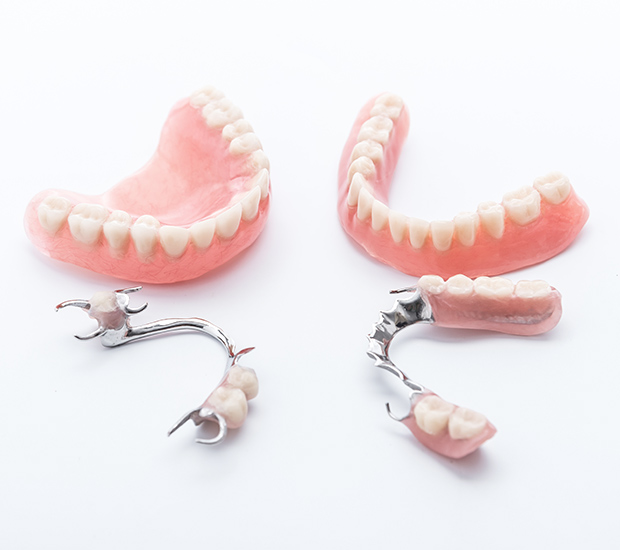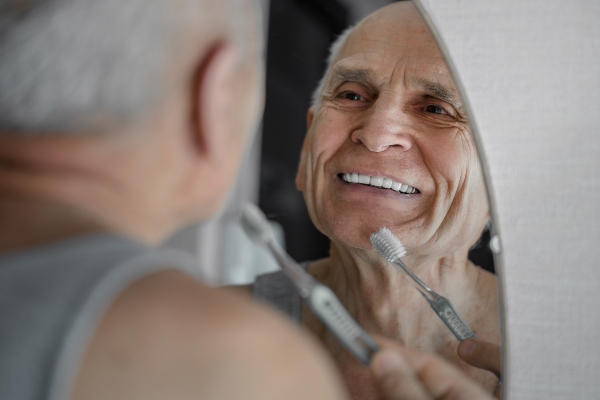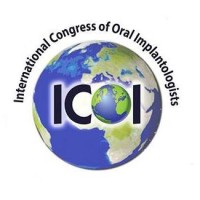Dentures and Partial Dentures Encino, CA
You have probably heard about partial and full dentures as treatments for tooth loss. If you are now facing this problem and want to do something about your smile, these are great solutions. Living with missing teeth can make things difficult for eating, but it can also affect your self-esteem. Dentures and partial dentures are practical solutions to restore mouth function and help patients enjoy smiling once again.
Dentures and partial dentures are available at Encino Cosmetic & Dental Implants in Encino and the surrounding area. Our staff can evaluate your condition and determine which option is the right fit for you. Whether you are missing a few teeth, several teeth, or all your teeth, dentures may provide the relief you have been anticipating. Because our professionals have the necessary knowledge and training, you can feel at ease knowing we can set you on the path to a beautiful smile.
Call our office today at (818) 578-2333 so you can make an appointment.
Reasons to Get Dentures
While there are other options available, there are several reasons that so many people turn to dentures:
- Denture may be an affordable solution to tooth loss. Other tooth replacement options tend to cost more, contingent upon the insurance provider. Traditional full dentures and partial dentures are typically more cost-efficient than alternatives. This is true even when factoring in the cost of replacing the dentures every 5-10 years.
- Lower risk associated with denture procedure. The patient prefers to avoid the potentially painful failure risk associated with bridges. Dental implants also require more invasive surgery, by nature making them riskier. Age and potential bone loss can increase risk.
- Denture can be received relatively quickly. Dentures typically take less time to receive than implants. Dental implants may take a year or more to complete. Healing periods between steps may last for up to six months.
Check out what others are saying about our denture and partial denture services on Yelp: Dentures and Partial Dentures Encino
Choosing Dentures for Tooth Replacement
Dentures and partial dentures only represent one of the many options patients can choose from.
When to Get Dentures
Dentures become a viable option almost every time someone loses their teeth. Even the loss of one tooth can result in the use of partial dentures to rectify the problem. If a person decides to get implants or bridges, they may still wear dentures temporarily until this work is completed.
Note that young people lose their teeth too. One of the most common reasons for this is facial trauma, such as a sporting injury, motor vehicle accident, or a bad fall. These instances can lead to not just missing teeth, but also cracking and breaking.
In addition to this, young people may struggle with cavities. In fact, tooth decay affects people of all ages, especially those who love sugary foods and fizzy drinks. People with poor dental hygiene may also suffer more from caries than others.
Another effect of poor dental hygiene is gum disease, which is sometimes known as periodontal disease. This infection of the gums and the material surrounding the teeth may lead to complete tooth loss over time. People who smoke are more likely to suffer from gum disease than others.
Finally, there are several other health conditions and medications that may result in tooth loss. Diabetes, ectodermal dysplasia, rheumatoid arthritis, and gastrointestinal reflux may all increase the likelihood of tooth loss over time.
How Dentures Are Made
Some processes may differ depending on the materials used in making dentures, but it typically advances in the following sequence.
The process starts with taking an impression of the mouth. The dentist then creates a model using dental stone as a cast. The doctor may then ask the patient to try several different sets of sterilized dentures to determine the ideal fit as well as the preferred color and size of the teeth. After these selections, the dentist may then make some adjustments to the cast. Thereafter, it is sent to a dental laboratory for completion.
At the dental lab, technicians may then create a wax version of the gum line. These technicians make the replacement teeth from a material that closely resembles real teeth known as resin. Virtually all labs then seek approval from the patient and dentist before proceeding with the finishing touches.
Following approval, the technician removes the wax and replaces it with acrylic, which looks far more realistic. This process entails boiling to get rid of the wax, drilling holes in the teeth, and then injecting the acrylic. Finally, technicians clean up the teeth and polish the appliance. The entire process may require the patient to visit the dentist’s office four to five times.
Types of Dentures
When patient’s lookup types of dentures, they mostly come across full dentures and partial dentures. However, these are just the tip of the iceberg. Over the past few years, dentists created hybrids with other dental treatments to provide patients with even more options. You may contact one of our Encino Cosmetic & Dental Implants team members to find out which denture is right for you.
1. Full Dentures
Most commonly used by seniors, these dentures replace a complete set of teeth. They sit directly on top of the gums. Some patients are good candidates for immediate placement. In this instance, the dentist places the previously made dentures immediately after the extraction of the teeth. For everyone else, the dentist may recommend waiting eight to 12 weeks after teeth removal.
2. Partial Dentures
When a patient still has teeth to blend in and anchor with the newly created teeth, the dentist may recommend partial dentures. This may require the use of a metal piece to which a pink-colored base is attached. The metal helps to anchor the false teeth to the natural teeth to prevent movement.
When a patient still has teeth to blend in and anchor with the newly created teeth, the dentist may recommend partial dentures. This may require the use of a metal piece to which a pink-colored base is attached. The metal helps to anchor the false teeth to the natural teeth to prevent movement.
3. Implant-Supported Dentures
This method blends dental implants with dentures. Instead of anchoring all the teeth in place individually, the dentist may add several dental implants that hold the full upper and/or lower set in place. Dentists may use this for partial dentures too. These dentures are not removable once in place. Please note that not all patients are good candidates for dental implants.
4. Overdentures or Snap-In Dentures
When patients prefer to retain the ability to remove dentures, but like the stability of implants, they may opt for overdentures. These are handy in instances where a person has no teeth, as the dental implants provide an anchor that the teeth can sit on. For even more excellent stability, patients may opt for snap-in dentures. In this case, the implants have locator receptors, and the dentures have attachments. These work together to snap the dentures into place for a snug fit.
Replacement Choices to Discuss
Dentures and partial dentures are two of the most common forms of tooth-replacement treatment. While there are other options available at our practice, we will determine the most effective option for the patient's specific needs. Every patient’s situation and needs a different solution.
With dental bridges and dental implants, there are a variety of factors to consider when deciding on a replacement option. During a consultation, we will answer any questions the patient has about the various options so they can make an informed decision.
Choosing Dentures and Partial Dentures Over Other Treatments
It can be difficult deciding which option is right when deciding on an effective tooth replacement option. Each patient will have to consider the pros and cons while also looking into insurance coverage. During a consultation in our office, we can go into more detail about the specifics. A determining factor is the amount of time a patient can take out of their schedule for treatment.
In most cases, the dental implant process can take several visits over the span of months. With dentures or partial dentures, the patient will most likely need two visits before they can begin wearing their dentures. Along with that, dentures and partial dentures can replace multiple teeth at once as opposed to dental implants, which only replace one at a time.
Care and Maintenance of the Dentures
Though dentures are durable and help the patient once again bite into food, these appliances can break. Dentures can also warp or get dirty, so it is vital that people follow proper maintenance guidelines, as described in this article on the American Dental Association website. Our team at Encino Cosmetic & Dental Implants will counsel each patient on proper care to extend the life of their dentures. Though, ultimately, it is up to the patient to be diligent in routine care and contacting the dentist when problems arise.
After eating a meal, a patient should remove their dentures and rinse the appliance thoroughly with water, removing excess food. Also, patients should brush the dentures with a soft toothbrush and non-abrasive toothpaste. When it is time to retire for the night, the person should remove the dentures. Some denture wearers soak their dentures in a solution. You may contact our team to see if a denture solution is recommended for your care routine.
What to Do in Case of Breakage
There are plenty of ways to repair your dentures in the event of an accident. It is almost inevitable that patients will find a crack or break in the appliance at some point. The base could crack, or a tooth could break loose. For a quick fix, there are products available online and at most local grocery stores and pharmacies, such as D.O.C.® Repair-It®, Cushion Grip®, and Perk ®'s Denture Repair Kit. If you are considering using a product for a temporary fix, please contact your dental office first. Whenever significant damage occurs, like a large crack across the base, you should seek medical treatment.
In any case of breakage, the denture-wearer should contact our office right away. Our team has the right tools and equipment to fix the dentures properly. Patients can feel good that our dental professionals will carefully examine the damage and repair it. If necessary, the dentist may have to replace the dentures altogether.
Avoiding Problems
While some situations may be challenging to prevent, patients can minimize repair needs. People with dentures should be careful with certain hard foods such as nuts, popcorn kernels, ice, and candy. Some sticky foods may also pull out the dentures. When cleaning the appliance, the individual should place a towel or cloth on the counter or in the sink in case the dentures fall. Denture-wearers who play sports should wear a mouthguard to protect the dentures.
Denture Myths Versus Reality
There are many misconceptions about dentures that can stand in the way of people getting the care they need. Learning the facts about some common myths can help patients better understand their options. Talk to our team to get further information and specific advice for your situation.
- Myth #1: Discomfort and irritation is a normal part of having to wear dentures. Today’s techniques allow the creation of dentures that fit well. If you are not comfortable, it is a sign that something is wrong. If this is the case, consult a dentist.
- Myth #2: Getting dentures means not having to return to the dentist again. Even if you no longer have natural teeth, seeing the dentist at least once a year is vital to maintaining oral health. Dentists can identify and treat gum issues and other problems. They can also adjust your dentures and make sure everything is going well.
- Myth #3: Getting dentures means never being able to eat anything besides soft food again. While it can take a little time to adjust to the feel of eating with dentures, many people can enjoy a variety of foods. The dental team can talk to you in further detail about any concerns regarding the potential effect of your diet on your dentures.
Questions Answered on This Page
Q. Are there different types of dentures?
Q. Are there dentures to replace a few of my teeth?
Q. What are the benefits of dentures?
People Also Ask
Q. How do I take care of my dentures?
Q. What do I do if I damage my dentures?
Q. What do I need to know about making adjustments to my dentures?
Definition of Denture Terminology
- Alveolar Bone
- The alveolar bone is the bone surrounding the root of the tooth that keeps the tooth in place.
- Clasp
- A clasp is a device that holds a removable partial denture prosthesis to the teeth.
- Denture Base
- The denture base is the part of the denture that connects the artificial teeth with the soft tissue of the gums.
- Edentulous
- Edentulous is a term that applies to people who do not have any teeth.
- Periodontal Disease
- Periodontal disease is a condition that causes inflammation of the gingival tissues and membrane of the teeth, leading to tooth loss without professional treatment.
- Pontic
- Pontic is another term for an artificial tooth on a fixed partial denture.
- Rebase
- Rebase is the process of refitting denture prosthesis by replacing the base material.
- Reline
- Reline is when a professional resurfaces the surface of the prosthesis with a new base material.
- Resin/Acrylic
- Resin and Acrylic are resinous materials that can be components in a denture base.
- Stomatitis
- Stomatitis is the inflammation of the tissue that is underlying a denture that does not fit properly. It can also result from other oral health factors.
Back to top of Artificial Teeth








